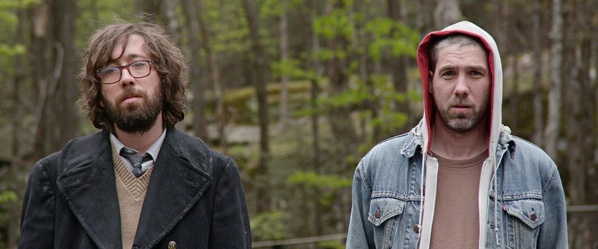When confronted with a screwed up world, most people would rather make a serious documentary or donate to a charity than take out their frustrations with a comedy about two friends, but writer/director Eddie Mullins takes the latter approach with his recent “preapocalyptic” comedy, Doomsdays, about living in the woods and looting vacation homes for supplies. The movie is about the end of the world, which can be hard to pull off, but Mullins says that it’s easiest for him to be lighthearted about a subject: “When I first started working on it, I thought it would be a fraught, issue-driven picture and it’s not my natural mode.” As a result, the film is a series of gags and great dialogue exchanges that capture the absurdity and silliness of the end of the world.
Bruho and Dirty Fred are two twenty-somethings that spend their days hiking through the Hudson Valley. They break into homes, loot them for medicine and alcohol, and stay for as long as they can without being detected. They have the lifestyle of bums but with the disposition and mannerisms of well-educated, frustrated college graduates. Bruho is angry and temperamental, getting into fights with anybody he can, while Dirty Fred is a jaded nihilist that can sweet talk himself out of any situation. It’s a strange blend, but they fit together perfectly like a 21st century Odd Couple. Mullins says that he sees them as two halves of himself: “I was once the angry young man and now I’m the nihilist.” The two of them are the driving force behind Doomsdays. Their dialogue is nonsensical and irreverent, yet endlessly compelling. It’s like a rural Waiting For Godot, but with a lot more stuff happening. The story is structured episodically with lots of disconnected encounters and adventures. Mullins told me that he was inspired by Don Quixote and an Eisenstein theory: if things keep happening, you’ll keep the audience’s attention. It’s certainly not a slow film, but it’s not blazing fast, either. Doomsdays is content to keep to its own pace while taking twists and turns that reveal more about the characters and the world of the film. “The arrival of new characters are seismic events” that he placed “at traditional act points” to keep this nontraditional film on track, but beyond that, there’s no stopping Doomsdays from being exactly what it wants to be.
Visually, Mullins took both a practical and artistic approach to the quick eighteen-day shoot. The film was designed with a small crew in mind so things could be rendered in a single shot. He admitted to me that he hates coverage because it wears out the cast and crew, so he took inspiration from William Wyler and Roy Anderson to create shots that could “create and sustain visual interest through blocking, staging, and various reveals.” Doomsdays has a ton of long shots that feel more like a filmed play than a film: “It’s a mixed blessing because they don’t have to do 57 takes of a simple conversation but they have to be able to sustain a performance.” The actors do a fantastic job of making their performances feel natural. Justin Rice and Eddie Mullins had been friends for years, so by the time Justin signed on to the project, Eddie had gotten a firm grasp on what kinds of things he could say as Dirty Fred. Leo Fitzpatrick came about through a traditional audition process but was chosen almost immediately; he plays Bruho with a genuine air about him that’s rare for angry comedic-relief characters. Think Walter from The Big Lebowski but less of a caricature.
We spend 100 minutes with Bruho and Dirty Fred as they get by with the strange lifestyle they’ve chosen for themselves. There’s a lot of talk about the end of the world and how screwed up things have become, but the true nature of the world Doomsdays shows us is told with perfectly paced reveals and character development. The two lead “a delightfully irresponsible lifestyle” that Mullins thinks a lot of people can relate to: “It’s a whimsical film [and] it’s fun watching them loot stuff. Anybody who’s intellectually alert has to have some reservations about the future. There’s no happy event horizon, so the best we can hope for is to slow down the collapse.” My favorite line in the film is one that sums up the film’s attitude: “If you’re on the Titanic and you can see there’s no room on the lifeboats, why not live it up at the bar?” This carefree and lighthearted take on the end of the world is certainly a welcome addition to a genre that’s crowded with intense zombie outbreaks or heavy environmental messages. Mullins avoids those tropes by doing what he knew he could do best from the very beginning: make a character-driven comedy. Doomsdays succeeds not only as a great comedy, but strikes a rare chord about the state of the world that no other film has done before.
Grade: A

 RSS Feed
RSS Feed
